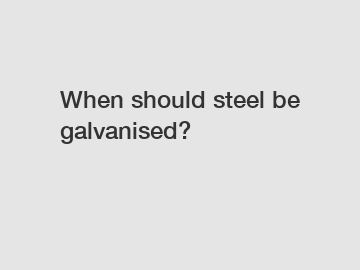Mar. 19, 2024
Construction
Steel is a widely used material in construction and manufacturing due to its strength and durability. However, steel is prone to rust and corrosion when exposed to moisture and harsh elements. To protect steel from corrosion, it can be galvanised, which involves coating the steel with a layer of zinc. But when should steel be galvanised? Let's delve into the details.
What is Galvanisation?
Galvanisation is the process of applying a protective zinc coating to steel to prevent rust and corrosion. The zinc coating acts as a sacrificial anode, corroding before the steel does. This process provides long-lasting protection to the steel, making it ideal for outdoor applications or environments with high humidity or exposure to chemicals.

When to Galvanise Steel?
1. Outdoor Applications: If you are using steel for outdoor structures such as fences, gates, or roofing, galvanising is highly recommended. The zinc coating provides a barrier against moisture, preventing rust and increasing the lifespan of the steel.
2. Marine Environments: Steel used in marine environments is exposed to saltwater, which accelerates corrosion. Galvanising the steel helps protect it from the corrosive effects of saltwater, making it ideal for docks, piers, and shipbuilding.
3. Industrial Settings: In industrial settings where steel is exposed to chemicals or high humidity, galvanising can offer added protection against corrosion. Galvanised steel is commonly used in manufacturing plants, chemical processing facilities, and wastewater treatment plants.
4. Underground Structures: Steel used in underground structures such as pipelines, culverts, and storage tanks is susceptible to corrosion from soil moisture. Galvanising the steel can prevent rust and extend its lifespan, making it a cost-effective solution for underground applications.
5. High-traffic Areas: Steel structures in high-traffic areas such as bridges, highways, and railways are subject to wear and tear. Galvanising the steel can provide an extra layer of protection against corrosion, ensuring the structural integrity of the infrastructure.
6. Extreme Weather Conditions: If your steel structures are exposed to extreme weather conditions such as heavy rainfall, snow, or intense heat, galvanising can help protect them from corrosion. The zinc coating acts as a shield, keeping the steel safe from the elements.
In conclusion, galvanising steel is essential in environments where corrosion is a concern. By applying a protective zinc coating, you can ensure the longevity and durability of your steel structures. If you are unsure whether your steel needs to be galvanised, consult with a professional supplier who can assess your specific requirements.
If you have any questions about galvanising steel or need assistance with selecting the right coating for your project, contact us. Our team of experts can provide guidance and support to help you make informed decisions about galvanising your steel structures. Remember, prevention is key when it comes to protecting your steel investments. Choose galvanising for long-lasting corrosion protection.
Want more information on PPGI Prepainted Steel Coil For Air Conditioners, Galvalume Steel Coil for LCD frames, Galvalume Steel Coil for exterior wall panels? Feel free to contact us.
If you are interested in sending in a Guest Blogger Submission,welcome to write for us!
All Comments ( 0 )